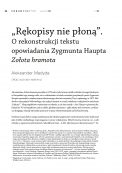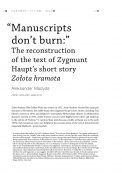Aleksander Madyda (1958) – prof. dr hab.; Uniwersytet Mikołaja Kopernika w Toruniu. Zajmuje się literaturą polską XX wieku, edytorstwem i tekstologią. Autor książek: Haupt. Monografia (Toruń: Wydawnictwo Naukowe Uniwersytetu Mikołaja Kopernika, 2012), Od filologii do antropologii. Szkice (Toruń: Wydawnictwo Naukowe Uniwersytetu Mikołaja Kopernika, 2015), Zygmunt Haupt, Baskijski diabeł. Opowiadania i reportaże, zebrał, oprac. i notą edytorską poprzedził Aleksander Madyda, wstęp Andrzej Stasiuk, wyd. 2, zm. i popr. (Wołowiec: Wydawnictwo Czarne, 2016), Zygmunt Haupt, Z Roksolanii. Opowiadania, eseje, reportaże, publicystyka, warianty, fragmenty (1935–1975), zebrał, oprac. i notą edytorską opatrzył Aleksander Madyda (Toruń: Wydawnictwo Naukowe Uniwersytetu Mikołaja Kopernika, 2018).
Aleksander Madyda (b. 1958) – prof. dr hab.; Professor at Nicolaus Copernicus University in Toruń. His research interests include twentieth-century Polish literature, editing and textology. He is the author of the books Haupt. Monografia [Haupt. Monograph] (Toruń: Wydawnictwo Naukowe Uniwersytetu Mikołaja Kopernika, 2012), Od filologii do antropologii. Szkice [From philology to anthropology. Sketches] (Toruń: Wydawnictwo Naukowe Uniwersytetu Mikołaja Kopernika, 2015), Zygmunt Haupt, Baskijski diabeł. Opowiadania i reportaże [The Basque devil. Stories and reportages], collected, edited and with an editorial note by Aleksander Madyda, preface by Andrzej Stasiuk, 2nd amended and supplemented edition (Wołowiec: Wydawnictwo Czarne, 2016), Zygmunt Haupt, Z Roksolanii. Opowiadania, eseje, reportaże, publicystyka, warianty, fragmenty (1935–1975) [From Red Ruthenia. Stories, essays, reportages, journalism, variants, fragments (1935–1975)], collected, edited and with an editorial note by Aleksander Madyda (Toruń: Wydawnictwo Naukowe Uniwersytetu Mikołaja Kopernika, 2018).

A b s t r a k t
Artykuł jest poświęcony rekonstrukcji brakujących fragmentów opowiadania Zygmunta Haupta Zołota hramota, której dokonano na podstawie znajomości całego dorobku pisarskiego, charakteryzującego się powtarzalnością motywów i odpowiadających im sformułowań językowych. (...)

A b s t r a k t
The article is devoted to the reconstruction of the missing fragments of Zygmunt Haupt’s short story Zołota hramota. Expert knowledge of Haupt’s entire oeuvre and style, characterized by recurring motifs and corresponding expressions, was the basis for the reconstruction. (...)







